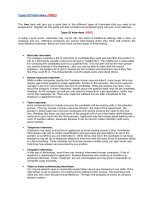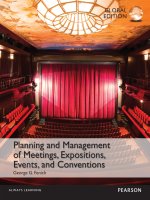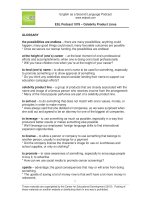ESL podcast 884 types of meetings
Bạn đang xem bản rút gọn của tài liệu. Xem và tải ngay bản đầy đủ của tài liệu tại đây (89.62 KB, 9 trang )
English as a Second Language Podcast
www.eslpod.com
ESL Podcast 884 – Types of Meetings
GLOSSARY
status update – information about one’s progress toward a goal, or information
about what one is currently working on
* The boss was really disappointed with my status update. I guess I’ll have to
start working harder.
teleconference – a meeting that occurs using telephones or other technology
when the participants are in two or more locations
* When is the best time to schedule a teleconference with callers in Mumbai,
Berlin, and Chicago?
brainstorming session – a meeting where two or more people try to create a
long list of ideas without evaluating whether they are good or bad
* A good brainstorming session could lead us to some really creative solutions.
lunch meeting – a meeting that occurs during the regular lunch break while
eating, especially at a restaurant
* Duncan’s mentor advised him never to order messy foods like spaghetti or crab
during a lunch meeting.
personnel meeting – a meeting used to discuss an employee’s performance
and progress toward goals; a performance evaluation meeting
* Personnel meetings make James really uncomfortable, because he finds it
difficult to tell people they aren’t doing their job well.
to fit (something) in – to find time to do something in one’s busy schedule
* I can’t meet with you in person tomorrow, but I should be able to fit in a call at
3:30.
standing meeting – a meeting that occurs at the same time and place each
week or month
* Their department has a standing meeting each Tuesday morning at 10:00.
pitch meeting – a meeting where someone proposes a project and/or tries to
sell a product or service
* Vince has been to five pitch meetings in the past two weeks, but he still doesn’t
have any new clients.
1
These materials are copyrighted by the Center for Educational Development (2013). Posting of
these materials on another website or distributing them in any way is prohibited.
English as a Second Language Podcast
www.eslpod.com
ESL Podcast 884 – Types of Meetings
emergency meeting – a meeting that is organized with little or no advance
notice to talk about something that is very important and serious
* Management has called an emergency meeting to talk about the upcoming
acquisition.
damage control – efforts to minimize the negative consequences of something
and/or to stop a bad thing from getting worse
* When consumers found mold in the yogurt, the dairy company had to do a lot of
damage control with its buyers, the media, and the health department.
shareholder meeting – a meeting of the board of the directors and the people
who own stock (shares) in the company
* At the shareholder meeting, everyone voted to decide who would become the
next Chairman of the Board.
debacle – a disaster; a very bad failure, especially an embarrassing one; a
fiasco
* I’m surprised Janice still has a job after her role in the Acme debacle.
dinner meeting – a meeting that occurs during dinnertime while eating,
especially at a restaurant
* Don’t you think it’s inappropriate for a male supervisor to ask his female
employee to go to a dinner meeting on a Friday night?
breather – a break; a temporary rest from what one has been doing
* You’ve been studying for two hours. Why don’t you take a breather before
starting the next chapter?
to be due for – to be owed; to be expecting and deserving to have something; to
have expectations of having or doing something at a certain time in the future
* Piedro has been using that old computer for almost eight years and he’s due for
a new one.
2
These materials are copyrighted by the Center for Educational Development (2013). Posting of
these materials on another website or distributing them in any way is prohibited.
English as a Second Language Podcast
www.eslpod.com
ESL Podcast 884 – Types of Meetings
COMPREHENSION QUESTIONS
1.
a)
b)
c)
What happens in the department’s weekly brainstorming sessions?
People try to identify new ideas.
People evaluate their intellectual capabilities.
People work on very challenging problems.
2.
a)
b)
c)
What is a breather?
A period when one is very nervous or stressed and breathes very quickly.
A break from one’s other activities.
A meeting where people stand very close together.
______________
WHAT ELSE DOES IT MEAN?
to fit (something) in
The phrase “to fit (something) in,” in this podcast, means to find time to do
something in one’s busy schedule: “How are you going to fit in another volunteer
activity? You’re already involved in too many things.” The verb “to fit in” also
means to feel comfortable with a group of people and share interests and
characteristics with them: “Is your daughter fitting in well at school?” The phrase
“to fit the bill” means to be the type of person or thing that one needs or that one
was looking for: “We received a lot of applications for the job, so hopefully at
least one of them will fit the bill.”
to be due for
In this podcast, the phrase “to be due for” means to be owed, or expecting and
deserving to have something: “So many bad things have happened this past
year, I think we’re due for some good luck soon.” When talking about a pregnant
woman, the phrase “to be due” describes when she is expecting to give birth:
“Xanthe isn’t due until next month, but she’s already feeling really
uncomfortable.” When talking about directions, “due” means directly in a
particular direction: “Drive due north for 14 miles and then turn west.” Finally, the
phrase “to get (one’s) due” means to receive what one deserves: “I know this is a
really tough time for you, but if you keep working hard like this, one day you’ll get
your due.”
3
These materials are copyrighted by the Center for Educational Development (2013). Posting of
these materials on another website or distributing them in any way is prohibited.
English as a Second Language Podcast
www.eslpod.com
ESL Podcast 884 – Types of Meetings
CULTURE NOTE
Workaholics Anonymous
Workaholics Anonymous is an “association” (organization; club) of people who
want to stop working “compulsively” (feeling that one has to do something,
without feeling like one has a choice about it). The “workaholics” (people who
work all the time, feeling like they should not or cannot stop working) have
realized that their work is “taking over their life” (becoming one’s top priority),
interfering with their personal life, family, and other interests. The association is
also open to people who compulsively clean, “work out” (exercise), “volunteer”
(work without receiving payment), and more.
People who think they might be workaholics are given a list of 20 questions, such
as, “Do you get more excited about your work than about family or anything
else?” Or, “Have your long hours hurt your family or other relationships?” If they
answer “yes” to three or more questions, they are considered a workaholic and
are invited to participate in the association.
As with Alcoholics Anonymous, the people involved in “Workaholics Anonymous”
work through a 12-step process to make “conscious” (actively thinking about
something) positive changes in their life. Their participation can be “anonymous,”
meaning that their “true identity” (name; who someone is) is not “revealed”
(shared with other people) in public.
The organization was created in 1983. Most of the meetings are “face-to-face”
(in-person; with participants in the same room), but some are held online or “via”
(by means of) email or phone. There is also an “annual” (yearly; occurring every
year) conference.
______________
Comprehension Questions Correct Answers: 1 – a; 2 – b
4
These materials are copyrighted by the Center for Educational Development (2013). Posting of
these materials on another website or distributing them in any way is prohibited.
English as a Second Language Podcast
www.eslpod.com
ESL Podcast 884 – Types of Meetings
COMPLETE TRANSCRIPT
Welcome to English as a Second Language Podcast number 884 - Types of
Meetings.
This is English as a Second Language Podcast episode 884. I'm your host Dr.
Jeff McQuillan, coming to you from the Center for Educational Development in
beautiful Los Angeles, California.
Our website is ESLPod.com. Go there and download a Learning Guide for this
episode. You can do that by becoming a member of ESL Podcast.
This episode is a dialogue about different kinds of businesses meetings. Let’s get
started.
[start of dialog]
Susanna: All right, then. This meeting is over. We’ll meet again next week for a
status update.
Juan: Hey, do you have a few minutes to talk about tomorrow’s teleconference?
Susanna: Sorry, I’ve got to run. I’m late for my department’s weekly
brainstorming session. Can it wait?
Juan: Sure, how about a lunch meeting?
Susanna: I can’t. I’m holding personnel meetings over lunch all this week. It’s
the only way I can fit them in.
Juan: Okay, how about at 3:00 this afternoon?
Susanna: Sorry, I have a standing meeting with the directors once a month at
that time. Can you come by after the pitch meeting at 4:30?
Juan: I wish I could, but our department head has called an emergency meeting
for this afternoon to do some damage control after the shareholder meeting
debacle last week. Well, how about a dinner meeting?
Susanna: Only if we can have dinner at 9:30. I won’t be finished here until then.
Juan: Do you ever get a breather?
5
These materials are copyrighted by the Center for Educational Development (2013). Posting of
these materials on another website or distributing them in any way is prohibited.
English as a Second Language Podcast
www.eslpod.com
ESL Podcast 884 – Types of Meetings
Susanna: A breather? I think I’m due for one...in 2030.
[end of dialog]
Susanna says to Juan, “All right then. This meeting is over.” So she's ending a
meeting that she is leading, she is “running,” we might say. Susanna says, “We’ll
meet again next week for a status update.” An “update” (update) is news about
something that has happened. You've already had some situation going on,
some event taking place, and now you want the latest news. Usually it's
information about how things have changed. A “status (status) update” would be
news about how a project is progressing, how it's moving toward its goal. You're
giving news about some sort of business project that you're working on.
Juan says, “Hey, do you have a few minutes to talk about tomorrow's
teleconference?” A “teleconference” is a meeting where you are talking to people
on the telephone, usually several people are talking on the telephone at the
same time. That's a teleconference. Susanna says “Sorry, I've got to run.” When
someone says they've “got to run,” they mean they have to leave right now –
usually leave the building or leave the area where they are.
Susanna says, “I'm late for my department's weekly brainstorming session.” A
“session” (session) is another word for a meeting. It would probably be used in a
business context when talking about a meeting, but also in a medical context,
especially if you are going to a therapist, a psychotherapist, or a counselor.
Those are often called “counseling sessions,” where you’re meeting with the
doctor. Susanna is going to her department's weekly brain storming session.
“To brainstorm” (brainstorm) – one word – means to try to generate, think of,
come up with as many ideas as you can about a certain topic. When you
brainstorm, usually one person is writing down all of the ideas, and you don't
discuss the ideas when people are proposing them. You simply give your idea
and everyone gives their ideas, and then at the end, you decide which are the
good ideas and the bad ideas. Susanna says, “Can it wait?” Can your questions
wait, Juan? I've got a meeting to go to.
Juan says “Sure. How about a lunch meeting?” A “lunch meeting” would of
course be a meeting that you would have over the lunchtime. You would go
somewhere to eat and also talk about whatever business topic it is you need to
talk about. Susanna says, “I can't. I'm holding personnel meetings over lunch all
6
These materials are copyrighted by the Center for Educational Development (2013). Posting of
these materials on another website or distributing them in any way is prohibited.
English as a Second Language Podcast
www.eslpod.com
ESL Podcast 884 – Types of Meetings
this week.” “Personnel” (personnel) is another word for employees – the people
who work for a company. The personnel of a company are the employees of the
company. It's a little more formal, business-like word, but it means the same as
“employees.”
Susanna says, “It's the only way I can fit them in” – that is, having these
personnel meetings over lunch is the only way she can fit them in. “To fit
something in” is a phrasal verb meaning to find time to do something in your very
busy schedule. You have many things happening today. Somebody wants to talk
to you and you don't have time on your schedule, but you decide “to fit them in.”
You say, “Okay. I can meet you for five minutes in between this meeting and that
meeting.” You're fitting them in. Juan says, “Okay. How about at three o'clock this
afternoon?” Juan really wants to have this meeting, right? Juan says “How about
at three o'clock this afternoon?” Susanna says, “Sorry. I have a standing meeting
with the directors once a month at that time.” A “standing meeting” is a meeting
that occurs on a regular basis. It's a scheduled meeting that you have every
week or every month or maybe every year, but it's a meeting that occurs at the
same time and that is regularly scheduled.
Susanna then says, “Can you come by” – that is, can you come to my office –
“after the pitch meeting at 4:30?” A “pitch (pitch) meeting” is a meeting where
someone is trying to get their ideas approved by someone else. Someone is
proposing a project and they are presenting their proposal, their information, to
the people who will make a decision, usually to the bosses, in this case. The verb
“to pitch” means, in this case, to try to convince someone to accept or adopt your
ideas. Usually, “pitches” – in this case, as a noun – are things that you do to try
to get someone to either buy something or to give you money for some project
that you want to work on.
Juan says, “I wish I could,” meaning I wish I could come by after the pitch
meeting at 4:30, “but our department head (the leader of our department) has
called an emergency meeting for this afternoon.” An “emergency” is some
serious situation that takes place without any warning, without any planning. It's
something that happens suddenly, often unexpectedly. So an emergency
meeting would be a meeting that you weren't planning on having, but you need to
have because there is some sort of serious situation you have to take care of.
Juan says this emergency meeting is to do some “damage control after the
shareholder meeting debacle last week.” The expression “damage (damage)
control” means you are trying to minimize or reduce, lessen, the negative
consequences of something that has happened. You're trying to make sure it
doesn't get any worse. So, if a company, for example, makes a product, makes
7
These materials are copyrighted by the Center for Educational Development (2013). Posting of
these materials on another website or distributing them in any way is prohibited.
English as a Second Language Podcast
www.eslpod.com
ESL Podcast 884 – Types of Meetings
something and it doesn't work, and it sells it to people and people complain about
the product, the company will try to do damage control. They will say, “Okay, we
made a mistake here. Let's do something so that the mistake doesn't get any
bigger or that it doesn't cause us any more problems. Maybe we’ll give the
money back to everyone who bought this product.” That would be a form of
damage control.
Juan says his department needs to do damage control after the “shareholder
meeting debacle” last week. Your “shareholders” are the people who own shares
or stock in your company. Shares or stocks are partial ownership in a company.
“To be a shareholder” means to be someone who owns shares, owns stock in a
company. So, a stockholder meeting would be a meeting of all the people who
have stock in that company, who have a partial ownership of the company. A
“debacle” (debacle) is another word for a disaster, something that goes wrong,
very, very wrong.
Juan says, “Well, how about a dinner meeting?” How about having a meeting
over dinner, at night? Susanna says, “Only if we can have dinner at 9:30. I won't
be finished until then.” Juan says, “Do you ever get a breather?” – meaning, do
you ever get a break from your work, Susanna? Because you're working too
hard, Susanna, seriously. Juan says, “Do you ever get a breather?” Susanna
says, “A breather? I think I'm due for one in 2030.”
“To be due (due) for something” means that you are expecting and deserving to
have something. It's something that is, we may say, “owed you” – something that
you are supposed to get. “I'm due for a vacation.” That would mean I am
expecting a vacation soon. I deserve this vacation. I'm owed this vacation.
Now let’s listen to the dialog this time at a normal speed.
[start of dialog]
Susanna: All right, then. This meeting is over. We’ll meet again next week for a
status update.
Juan: Hey, do you have a few minutes to talk about tomorrow’s teleconference?
Susanna: Sorry, I’ve got to run. I’m late for my department’s weekly
brainstorming session. Can it wait?
Juan: Sure, how about a lunch meeting?
8
These materials are copyrighted by the Center for Educational Development (2013). Posting of
these materials on another website or distributing them in any way is prohibited.
English as a Second Language Podcast
www.eslpod.com
ESL Podcast 884 – Types of Meetings
Susanna: I can’t. I’m holding personnel meetings over lunch all this week. It’s
the only way I can fit them in.
Juan: Okay, how about at 3:00 this afternoon?
Susanna: Sorry, I have a standing meeting with the directors once a month at
that time. Can you come by after the pitch meeting at 4:30?
Juan: I wish I could, but our department head has called an emergency meeting
for this afternoon to do some damage control after the shareholder meeting
debacle last week. Well, how about a dinner meeting?
Susanna: Only if we can have dinner at 9:30. I won’t be finished here until then.
Juan: Do you ever get a breather?
Susanna: A breather? I think I’m due for one...in 2030.
[end of dialog]
I think our scriptwriter is due for a vacation thanks to all of her hard work. I speak,
of course, of our very own, Dr. Lucy Tse.
From Los Angeles, California, I'm Jeff McQuillan. Thank you for listening. Come
back and listen to us again right here on ESL Podcast.
English as a Second Language Podcast is written and produced by Dr. Lucy Tse,
hosted by Dr. Jeff McQuillan. Copyright 2013 by the Center for Educational
Development.
9
These materials are copyrighted by the Center for Educational Development (2013). Posting of
these materials on another website or distributing them in any way is prohibited.









